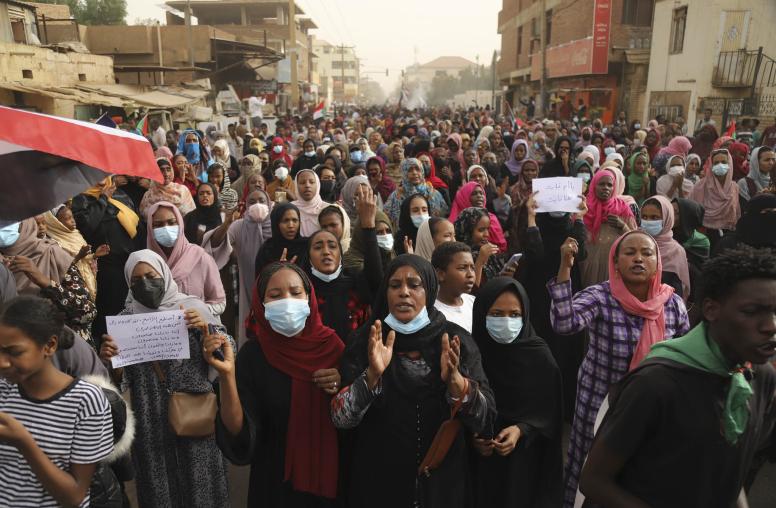Research & Analysis
U.S. Institute of Peace’s articles, reports, tools and other features provide policy analysis, research findings, and practitioner guides. These publications examine critical conflict issues at the center of the Institute’s work to prevent and resolve violent conflict.
The views expressed in these publications are those of the author(s).

In Venezuela, Nonviolent Action Is Key to a Negotiated Democratic Transition
On July 28, Venezuela held one of the most consequential elections in its history. The country’s political opposition, led by Maria Corina Machado, overcame popular disillusionment, political divides and a rigged electoral system to earn a landslide victory for its unity candidate, Edmundo González Urrutia. According to one civil society group, estimates “extrapolated from the official vote count receipts” from a representative sample of local voting centers give González 66% of the vote. Venezuela’s opposition met the moment with an inspired pro-democracy campaign.

En Venezuela, la acción no violenta es clave para una transición democrática negociada
El 28 de julio, Venezuela celebró una de las elecciones más importantes de su historia. La oposición política del país, liderada por María Corina Machado, superó la desilusión popular, las divisiones políticas y un sistema electoral amañado para obtener una aplastante victoria para su candidato de unidad, Edmundo González Urrutia. Según un grupo de la sociedad civil, los cálculos «extrapolados de los recibos oficiales del conteo de votos» de una muestra representativa de centros de votación locales otorgan a González el 66% de los votos. La oposición venezolana respondió al momento con una inspirada campaña prodemocracia.

What Role Can Nonviolent Social Movements Play in Peace Talks?
When negotiations between the Colombian government and the rebel FARC group kicked off in 2013, only one of the 20 negotiators was a woman. Two years later, 20 percent of government negotiators and 43 percent of FARC negotiators were women. Their participation broadened the agenda of the talks that led to the historic 2016 peace accord, which included important gender provisions. Women’s participation in the Colombia peace process was a clear peacebuilding success — and it was ultimately made possible by a diverse national women’s coalition, which mobilized to insist on gender-inclusive negotiations.

¿Qué papel pueden desempeñar los movimientos sociales noviolentos en procesos de paz?
Cuando comenzaron las negociaciones entre el gobierno colombiano y el grupo armado de las FARC en 2013, apenas había una mujer entre los 20 negociadores. Dos años más tarde, el 20% de los negociadores del gobierno y el 43% de los negociadores de las FARC eran mujeres. Su participación amplió la agenda de las negociaciones que desembocaron en el histórico acuerdo de paz de 2016, que incluía importantes provisiones en materia de género. La participación de las mujeres en el proceso de paz de Colombia constituyó un claro éxito en la construcción de paz, y fue posible gracias a una coalición nacional de mujeres muy diversa, que se movilizó para insistir en unas negociaciones que incluyeran la perspectiva de género.

In Nicaragua, Crackdown on Religious Actors Further Imperils Return to Democracy
In recent months, Nicaragua’s government has escalated its effort to silence dissent by waging a systematic campaign of repression against the Catholic Church. Nicaraguan President Daniel Ortega and Vice President Rosario Murillo’s crackdown on clergy and church-affiliated organizations critical of their authoritarian regime not only threatens Nicaragua’s religious freedom but also erects significant roadblocks to the country’s return to peace and democracy.

Colombia’s Imperfect Peace Could Provide a Roadmap for Afghanistan
The Afghan peace process was jumpstarted in September 2018 when President Trump appointed Ambassador Zalmay Khalilzad as special representative for Afghanistan reconciliation. Since then, Khalilzad has led 10 rounds of U.S.-Taliban talks, with negotiations focusing on two issues: ensuring the Taliban’s commitment to prevent transnational terrorists from using Afghanistan as a base for attacks, and a U.S. military withdrawal. As the search for peace in Afghanistan continues, what lessons can be learned from other peace processes that could apply to Afghanistan? Colombia’s imperfect peace agreement with the FARC is one especially relevant international reference point for Afghanistan—we explain why.